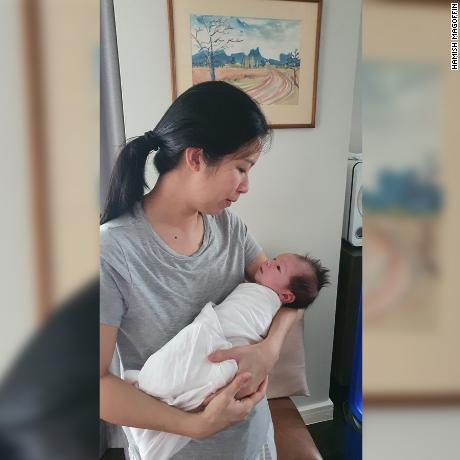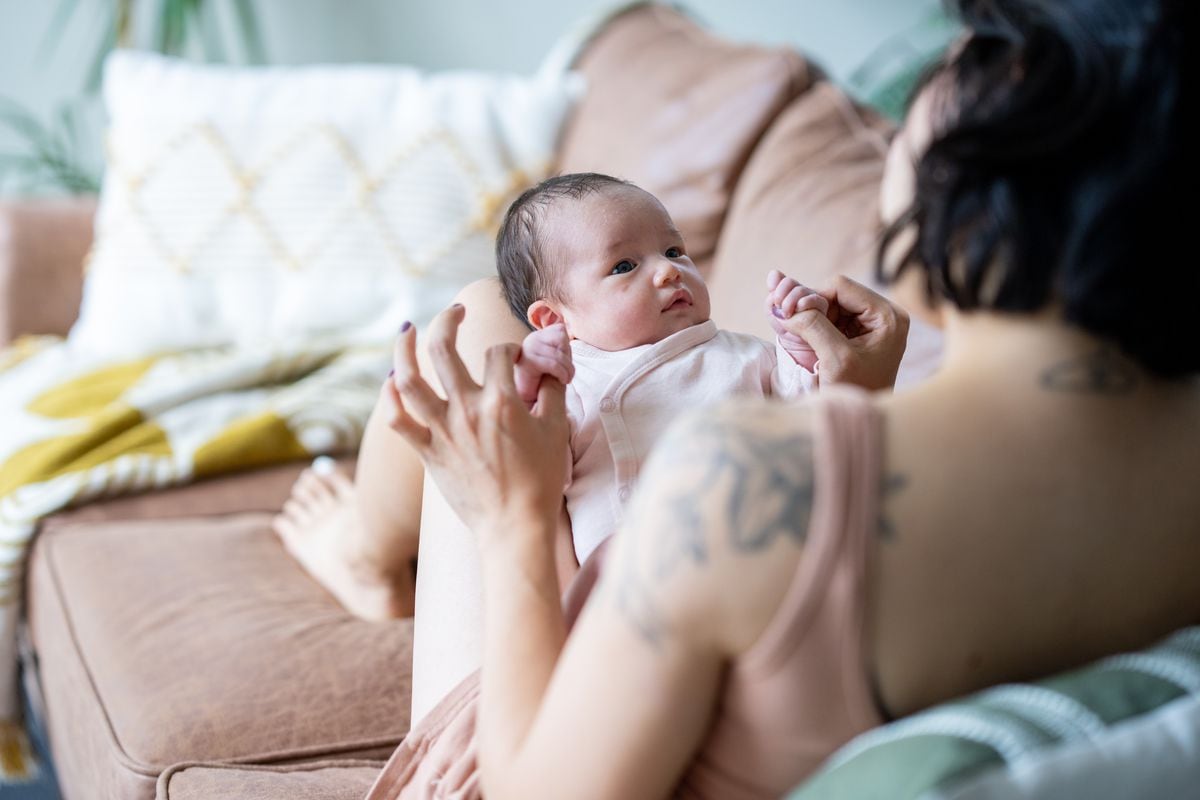(CNN) --
Pranaiya Oulapathorn used to say that her superpower was sleep.
"She'd go to bed and get ready for bed, and she'd be asleep in a minute," says her husband, Hamish Magoffin.
Her sleeping hours took a big hit when baby Arthur was born in March 2021, though the family, who live in Thailand, soon got used to the routine.
According to Magoffin, outside of the usual stress that comes with having a newborn, everything seemed to be going well.
However, within a few months, Pranaiya began to have difficulties.
Breastfeeding was challenging and the new mother felt that she was not able to give her child the milk that she needed.
Her milk ducts became clogged and her life became an endless cycle of nursing and pumping to get enough.
"She became obsessed with this and started putting pressure on herself to try and get as much breast milk as possible," Magoffin explains.
advertising
After several weeks, the couple decided to switch to formula, assuming this would reduce anxiety levels and improve Pranaiya's sleep.
But it was not like that.
"It was terrible. His sleep fell apart," said Magoffin, explaining that instead of resting, his wife developed insomnia.
Pranaiya was consumed with worry and was finding it harder and harder to get things done.
The 37-year-old, who used to be an active mother, had difficulty getting out of bed and regularly battled dark thoughts, which eventually took her over.
On September 1, less than six months after giving birth and a month after being diagnosed with postpartum depression, Pranaiya ended her life, and that of her son, Arthur.
Expert opinion:
Postpartum depression (PPD) is estimated to affect more than one in ten women during the first year after childbirth.
According to the World Health Organization (WHO), depression and anxiety during this period are the main causes of disability in women around the world.
While there are some risk factors, such as a history of mental health problems, PPD can affect anyone, says Chris Raines, a perinatal psychiatric nurse and board chair of Postpartum Support International, an organization focused on spreading the word. disorder and providing support.
"It doesn't distinguish between wealth or whether you're happy and things are going well. It's about how your body responds to hormonal changes and your body's predispositions to (those) changes."
The couple met in England, but went to live in Thailand, Pranaiya's country of origin.
Arthur was born in May 2021 in Thailand.
a happy mother
Pranaiya had a reputation for having a great relationship with children, and her friends' children referred to her as "the very nice aunt".
Having children of her own had not been a priority for Pranaiya, but once she and Magoffin decided to start a family, she really wanted to be a mother.
Getting pregnant was not easy, but the news came in the summer of 2020 and their son Arthur was born in Bangkok the following year.
In those first few weeks, Pranaiya was a happy mother, according to her older sister Pongnadda 'Pong' Oulapathorn.
She didn't seem to suffer from "baby blues," the mood swings brought on by sudden hormonal changes that many new moms experience in the first few weeks after giving birth.
The new family settled into routine with ease, even as the world around them began to shut down due to the covid-19 pandemic.
But things soon changed.
Expert opinion:
According to Raines, up to 80% of new mothers experience "baby blues" - temporary bouts of anxiety, crying or low mood in the first few weeks after giving birth, explaining that sudden drops in Progesterone and estrogen levels after childbirth can take women on an "emotional roller coaster."
"People are predominantly happy and all of a sudden they cry and feel overwhelmed and say 'Why am I crying? I have nothing to cry about,'" she says.
"It usually lasts about two to three weeks, and the symptoms gradually start to improve. If the symptoms don't improve or they get worse, that would be a red flag."
"Pranaiya was ambitious and driven," says her sister, Pong.
But she feared that she "wasn't a good mother."
feeling out of place
Pranaiya was ambitious and driven, says Pong.
She earned a master's degree from Oxford University, where she met her husband.
They returned to Thailand, where she worked at a major Thai bank before joining her family business.
"When she wanted something, she went for it, did it all for herself, and always got the results," says Pong.
But when it came time for motherhood, Pranaiya felt overwhelmed, Pong said.
She soon realized that no matter how hard she tried, things often didn't go the way she planned, and this became a major source of anxiety.
"Raising a baby for the first time, not everything could be under control... the breast milk, the baby itself. The stress was building day by day without her acknowledging it," says Pong.
At the same time, as the coronavirus spread, Thailand went into lockdown.
"The baby was one month old, and [Pranaiya] lived in a condominium with no garden and the outdoor walks she liked were restricted," Pong said.
The stress that started from Arthur's hunger did not go away, despite the switch to formula.
This caused Pranaiya to develop tinnitus and insomnia, so doctors prescribed steroids and sleeping pills to treat each of the conditions respectively.
But the drugs had little effect.
Expert opinion:
According to Raines, anxiety and insomnia are the most common symptoms of perinatal mood disorders (disorders that occur during pregnancy or in the first year after childbirth), including postpartum depression.
"Many people who seek help are anxious and, because they don't feel depressed, they don't think they have PPD," he says.
A sleeping baby should also be an opportunity for parents to rest, explains the nurse.
"If the baby is sleeping and the mother can't sleep... that's a red flag for me."
At Arthur's funeral, Magoffin referred to his "big toothless smile".
Pranaiya with his nephews.
want to disappear
In the months following Arthur's birth, despite experts saying he was fine, Pranaiya's husband says that she, too, worried too much about their son's development.
"She was afraid that she wasn't a good mother," says her sister Pong, and she kept bringing up the same questions over and over again, obsessing over whatever seemed like a problem.
In mid-July, Pranaiya recognized that things were not going well and, according to Magoffin, agreed to meet with a family friend who had suffered from, and recovered from, postpartum depression.
But at the end of that month, with Arthur just 4 months old, things took a dark turn.
Pranaiya started talking about wanting to disappear, wanting things to go back to the way they were before Arthur was born, saying that she didn't want Arthur around anymore.
"It was the way he said it," Magoffin said.
He began to worry about the safety of his wife and his son.
It was at that moment that he agreed to see a professional.
Expert take:
Raines says longing for life before the baby was born is all too common among his PPD patients, with many contemplating putting their children up for adoption "[They say] this is not what I wanted . This is not what I expected. I thought this was what I wanted to do, but it's not," he says.
"It takes time to help them understand that it's not her talking, it's the anxiety and the depression and the chemical changes that are talking."
Looking for assistance
The first doctor the couple went to did not help Pranaiya as the family hoped.
They asked her to take a questionnaire called the Edinburgh Postpartum Depression Scale (EPDS), a standard questionnaire used by doctors to identify symptoms of depression.
"We asked him, 'do you want to hear what we have to say?'
and he told us 'no, just take the quiz. Anything they say is going to be subjective, and I can't really give an opinion on it,'" Magoffin said.
With the EPDS, Pranaiya was diagnosed with high anxiety and mild depression, so the doctor prescribed antidepressants.
But, according to Magoffin, the medication seemed to have little effect.
Instead, Pranaiya's depression worsened and there were days when she couldn't get out of bed.
Unhappy with his approach, the family tried to find another doctor.
Expert Opinion:
The Edinburgh Postpartum Depression Scale is used as the standard for screening for PPD.
But Raines stressed that the Edinburgh test alone should not be relied upon for diagnosis.
A careful clinical evaluation is needed to confirm the diagnosis and establish a treatment plan.
Instead, Raines uses it "to gauge how the customer is feeling [and] as a starting point for conversation."
Pranaiya worried too much about her son's development, says her husband.
Paralyzed by anxiety and depression
As Pranaiya became more often unable to get out of bed, her relatives began to care for her while her husband took care of baby Arthur.
In August, a new doctor determined that Pranaiya's health had deteriorated to the point of requiring specialist care, recommending treatment at a private mental health hospital in Bangkok.
"In the beginning, the symptoms were quite severe and the risk of suicide was high," the psychiatrist who treated her there, the third doctor she saw, told CNN.
Inside a Depressed Mind: What Living With Depression Feels Like (Interactive)
The doctor, who did not want to be named due to hospital protocols and the sensitivity of the matter, said Pranaiya was diagnosed with postpartum depression and her symptoms, including suicidal thoughts, trouble sleeping and lack of energy or interest by activities, were consistent with those of a major depressive disorder.
So she was prescribed a high-dose antidepressant, along with art therapy and three sessions of transcranial magnetic stimulation, a noninvasive therapy that uses electrical impulses to stimulate parts of the brain known to be affected in depression.
After two weeks, Pranaiya seemed to be responding well to treatment.
She had fewer episodes of major depression, although she still felt depressed and anxious, the doctor explained.
In retrospect, the psychiatrist believes that Pranaiya would have benefited from being hospitalized.
It was something the family had considered, but covid restrictions prevented visits.
Expert opinion: According to Dr. Chutima Roomruangwong, a Thai psychiatrist specializing in psychiatric illnesses in women, it can be difficult to access psychiatric care in Thailand, even if patients have the resources to go to a private facility, because there are not enough psychiatrists in the country.
The Thai Psychiatric Association told CNN in an email that there are about 900 psychiatrists in the country of 70 million people, though not all are currently practicing.
In the UK, a country of 67 million, the figure is about 7,000 psychiatrists, according to the Royal College of Psychiatrists.
Specialists are even rarer.
Dr. Chutima is, to her knowledge, the only formally trained perinatal psychiatrist in Thailand.
The last month
Pranaiya's dark thoughts persisted, despite doctors trying a range of antidepressants and other therapies.
Medication changes and the fact that they didn't seem to work was another source of anxiety for Pranaiya, Magoffin said.
"The person you know starts to disappear, and the conversations you have with them are just shocking," Magoffin said.
"She said that she wanted to disappear, that she couldn't do this anymore and that she had failed as a mother because she had these thoughts."
In late August, Pong took Pranaiya to Huahin, a coastal city south of Bangkok, hoping a change of scenery would help.
Arthur was almost six months old now.
"She was so relieved [to be able] to get some fresh air without wearing a mask," Pong said.
"We took deep breaths, we stretched, we chatted, we threw a ball on the beach...she laughed, and this surprised her."
"The person you know starts to disappear," Magoffin said.
A painting made by Pranaiya as part of her art therapy.
When Magoffin and Arthur met up with them a few days later, Pranaiya seemed to be having a good time.
"It was a very happy day. The beach, taking Arthur, playing in the sand and hanging out in the pool and doing all those kinds of things that we were very excited about," recalls Magoffin.
"That was the last time I saw her," Pong said.
Although returning to Bangkok brought back some of his anxiety, Magoffin said that, overall, his wife's good humor seemed to persist.
The couple had organized a dinner to celebrate their tenth anniversary, and Magoffin said that he had been looking forward to the evening.
The next morning, while he was in the shower getting ready, Pranaiya ended his and Arthur's lives.
Expert Opinion:
Suicide is rare in the perinatal period, but figures show it is a leading cause of death within a year of the end of pregnancy in the United States and the United Kingdom, and research show that women who die by suicide in the perinatal period are more likely to have a diagnosis of depression, compared to women who are not pregnant or who have not given birth in the previous year.
Current WHO guidelines indicate that all postpartum women who test positive for depression or anxiety should also be screened for risk of self-harm, suicide, and harm to the baby.
raise awareness
Pranaiya's family now focuses on his legacy.
Pranaiya's grieving family now focuses on his legacy.
Following her harrowing experience with postpartum depression, Magoffin set out to raise awareness and work on programs that provide better education, care and research on this disease.
As the doctor who treated Pranaiya said, it couldn't be more necessary.
"Postpartum depression is as common in Thailand as it is in other countries, and is usually mild to moderate, but many patients are not diagnosed and treated because there is not enough awareness and there is stigma," she said.
"We don't have a good system to educate, detect and treat PPD."
"After losing them, all I could do was go for a walk. Just one foot in front of the other," says Magoffin.
(Credit: Sofia Couceiro/CNN)
Magoffin created a foundation in honor of his wife and son, launched earlier this year.
To mark the occasion and raise money and awareness, he ran a 1,369-kilometre walk and bike race across Britain.
It took 17 days and raised more than $63,000 in donations, most of it from Thailand and the UK.
But the challenge is also meant to help you with grief.
"After losing them, all I could do was go for a walk. Just one foot in front of the other. I didn't even feel like running or doing anything, just walking slowly," he said.
Arriving at Land's End, the westernmost point of mainland England, he said he sat on the rocks and looked out to sea remembering his wife and son and the happy times they had together.
In the farewell notes she left for Magoffin and her family, Pranaiya stressed that they had done everything they could to help her.
"You are my happiness," he wrote to Magoffin.
At his funeral, Magoffin replied, "Munchkie, I want you to know how much I love you. You are my happiness too."
--
If you or someone you know may be at risk for postpartum depression, here are ways to help.
If you're in the United States, you can call the PSI Helpline at 1-800-944-4773 or text "Help" to 800-944-4773.
To find support in other countries, see a list of providers here.
To join an online support group, click here.
How to get help for someone who might commit suicide
Call 1-800-273-8255 in the United States to contact the National Suicide Prevention Lifeline. Provides free and confidential assistance 24 hours a day, seven days a week, for people in suicidal or distressed crisis. You can learn more about their services here, including their guide on what to do if you spot suicidal signs on social media.
You can also call 1-800-273-8255 to speak with someone about how you can help someone in crisis. Call 1-866-488-7386 for the Trevor Lifeline, a suicide prevention counseling service for the LGBTQ community.
For assistance outside the US, the International Association for Suicide Prevention provides a global directory of resources and international hotlines. You can also turn to Befrienders Worldwide.
See here the lines of attention and prevention of suicide in Latin America and Spain.




/cloudfront-eu-central-1.images.arcpublishing.com/prisa/EJM4QIP3DRFBDPKSBLVSA5YHYU.jpg)










